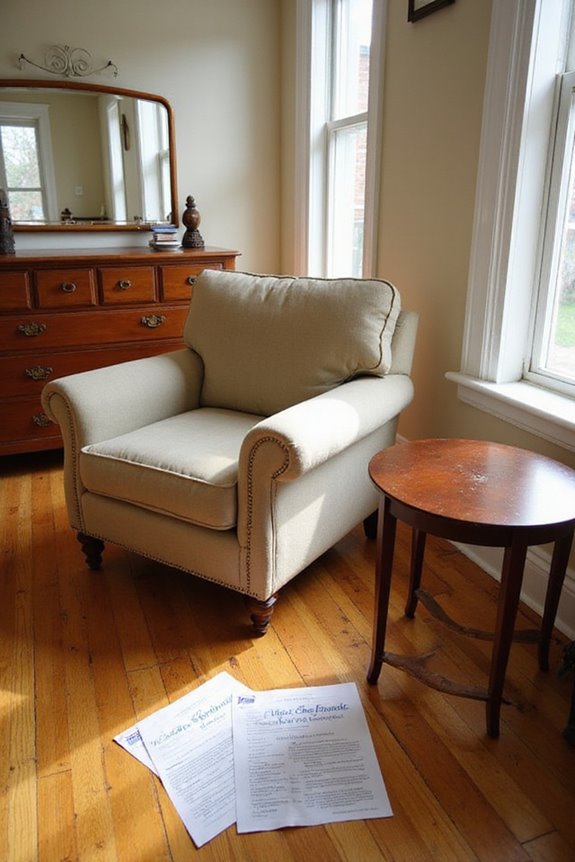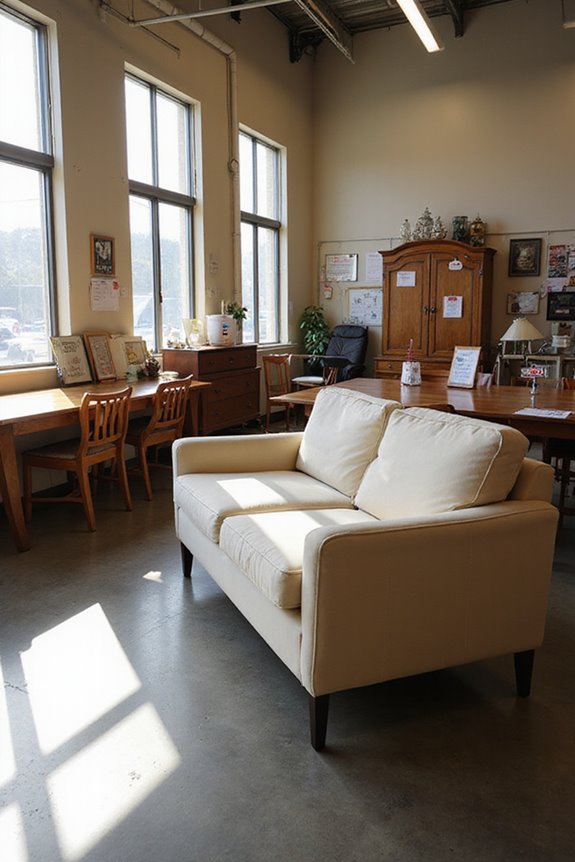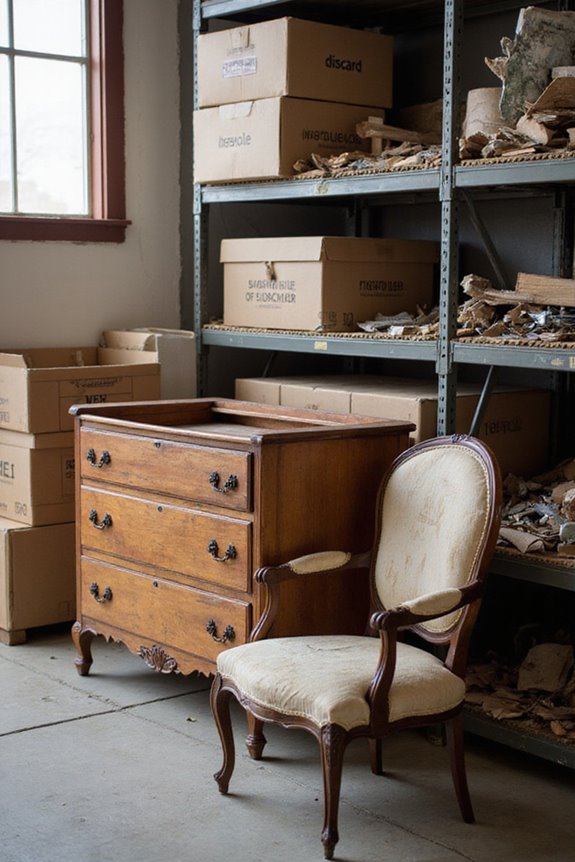Yes, Goodwill does take furniture! But hold on—what they accept can really depend on your local store’s guidelines. Generally, they’ll love smaller items like lamps or cute vases, but big couches might be a no-go. Remember, your donations need to be clean and in good condition. So, why not check their specific rules before you haul your old treasures out? Stick around, and you’ll find out more about the donation process and community benefits!
Key Takeaways
- Goodwill accepts furniture donations, but acceptance varies by location and specific guidelines.
- Smaller items like lamps and decorative vases are commonly accepted; larger items may be rejected.
- Furniture must be in good working condition, clean, and free of damage or stains.
- Donations can be dropped off or scheduled for pickup, with staff assistance available at donation centers.
- Contributions support job training programs and help reduce waste in the community.
Understanding Accepted Furniture Items

When it comes to donating furniture to Goodwill, you’ll want to know what items are a big yes and which ones just won’t make the cut. Most Goodwill locations are picky about furniture variations, so don’t be surprised if your large exercise equipment or that big couch gets turned away. Regional policies play a huge role; some areas might accept small furnishings, while others stick to smaller items like lamps and decorative vases.
Curious if your local Goodwill will take that chair? It’s best to check their specific guidelines first! You never know when policies might change. If you find they don’t accept your furniture, don’t feel down—consider giving away small appliances or clean linens instead!
Condition Requirements for Donations

You might be wondering what makes furniture donation-ready for Goodwill. First off, it must meet their furniture guidelines and donation standards. So, if your piece is in good working or sellable condition, it’s a yes! Make sure it’s clean, fully assembled, and functional—no one wants a wobbly chair, right?
Plus, items should not have any stains or damage. You wouldn’t want to donate something that’s a safety risk, would you? Keep in mind that items with hazardous materials or recalls are a definite no-go! By ensuring your donations meet these requirements, you’ll help Goodwill support the community and even snag yourself a sweet tax deduction. How’s that for a win-win?
Donation Process at Goodwill

Donating your furniture to Goodwill can be a breeze, especially if you know the steps to take! First, gather your items and make sure they meet Goodwill’s donation guidelines. Curious about how to schedule your donation? You can drop off your things at a Goodwill store or an attended donation center. Some folks might even get lucky and use the donation pick-up service for those larger items! Just check online for nearby locations.
Once you arrive, staff will help you process the donation, and don’t forget to ask for a receipt—it’s handy for tax deductions! Remember, your donations support amazing job training programs. So, what are you waiting for? Happy donating!
What Happens to Unacceptable Donations

Not all items make the cut for donation at Goodwill, and understanding what happens next can save you a hassle. If your furniture’s dirty, broken, or heavily worn, you might face donation rejection. Yikes! But don’t worry, Goodwill has options. Unacceptable donations typically get sent for recycling or waste disposal, so they don’t just pile up.
If your item is non-working electronics or a stained armchair, consider local recycling programs—some Goodwill locations can help with that! It’s a smart move! Plus, it keeps our planet happy. Remember, you can always check with your local Goodwill store about what they accept. That way, you won’t have to lug that “vintage treasure” back home again!
Benefits of Donating to Goodwill

When you think about giving your old furniture to Goodwill, you might not realize just how many lives you’re impacting. By following the donation guidelines, you’re helping create jobs and providing essential training for people in your community. Isn’t that amazing?
Plus, your furniture recycling makes a difference environmentally! Instead of ending up in a landfill, your items are recycled or reused, saving resources and reducing waste. Did you know Goodwill helps conserve massive amounts of water through its recycling efforts?
And let’s not forget about the support they provide to veterans and underrepresented groups! Your donation can truly change lives while brightening up someone else’s home. So, what are you waiting for? Your old furniture could be the next big thing for someone in need!
Preparing Your Items for Donation
Before you rush off to drop off your donation, it’s essential to prepare your items properly so they’ll make a great impression! First, check the condition of your items. Are your clothes clean and free from damage? Clothes should be washed or dry-cleaned, and household items need a good wipe-down.
Next, let’s talk packing tips. Use boxes or bags to separate clothing from other donations. This makes it easier for everyone involved! And don’t forget about data protection—wipe any personal info from electronic devices before donating.
Lastly, grab a receipt for tax deductions! With these donation guidelines, you’re all set. Your thoughtful preparation makes a difference, and Goodwill will appreciate your efforts!
Alternatives for Items Goodwill Cannot Accept
While Goodwill is a fantastic option for many donations, sometimes you’ll have items that they just can’t accept. What do you do then? Don’t worry! There are plenty of furniture donation alternatives to explore. Local donation organizations, like specialized furniture centers, often provide pick-up services for your items. How convenient is that?
You might also consider participating in community events to share your furniture or using local online marketplaces to find it a new home. Looking to recycle instead? Check out your city’s furniture recycling programs! They can help reduce waste while giving your old items a second life. So, instead of stressing over what to do, get creative with these options! You’ve got this!
Community Impact of Your Donations
Donating your furniture truly makes a difference—it’s like passing the baton of goodwill! Every piece you give helps create community connections. Did you know that your donations support job training programs? In New York and New Jersey, over 9,000 folks received essential services this year alone! Imagine how many donation stories you could be part of!
Plus, preventing usable furniture from going to landfills benefits our planet! Less waste means lower carbon footprints—who wouldn’t want to feel good about that? Your contributions turn into coaching and career opportunities for neighbors facing barriers like disabilities. So, why not donate? By doing so, you’re not just clearing space; you’re building a better community! How awesome is that?
Frequently Asked Questions
How Does Goodwill Determine the Value of Donated Furniture?
Goodwill determines the value of your donated furniture by evaluating its condition and adhering to local donation guidelines. They’ll consider market demand and comparable sales to estimate its resale potential accurately.
Are There Specific Times for Drop-Off Donations at Goodwill?
Picture sunny afternoons when you’re enthusiastic to donate; check Goodwill’s drop off hours first. You’ll want to follow their donation guidelines to guarantee your items are welcome. A quick call can save you time!
Can I Schedule a Pickup for Furniture Donations in Advance?
You can definitely schedule a pickup for your furniture donations in advance. Just check the pickup service availability at your local Goodwill, as it varies by location, and arrange your appointment online or by phone.
What Should I Do if My Local Goodwill Doesn’T Accept Item Types?
If your local Goodwill doesn’t take certain items, you’ve still got options! Consider contacting alternative donation options or local charity resources like Habitat for Humanity or thrift stores that might happily accept your items.
Is There a Limit to How Many Items I Can Donate at Once?
There’s no specific limit on how many items you can donate at once, but it’s smart to check your local Goodwill’s donation guidelines. They might have some item restrictions based on capacity or policies.





